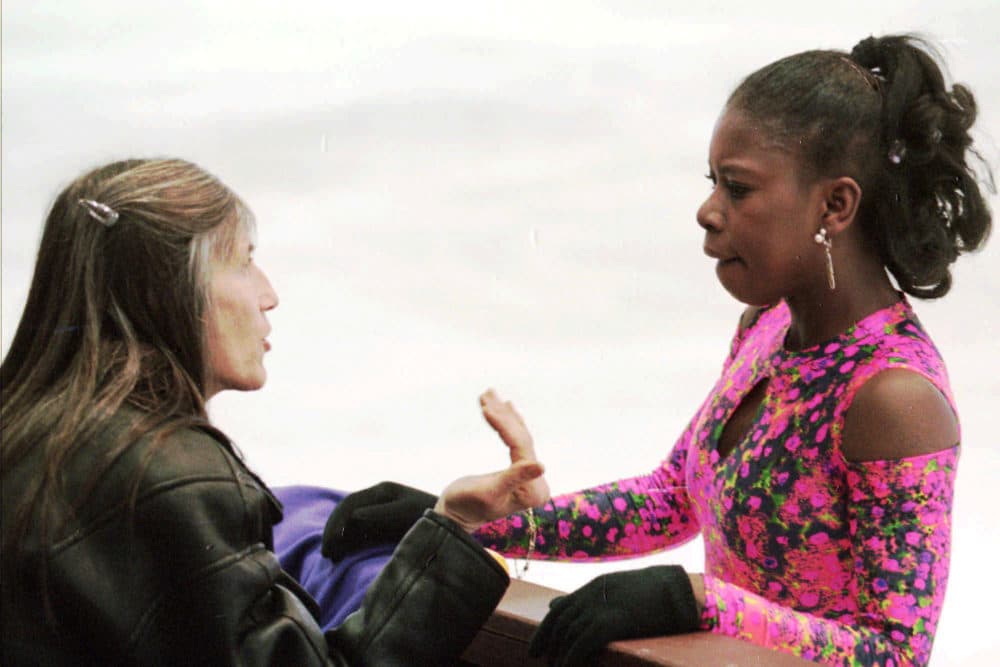Advertisement
'Please, Try To Be Fair': Surya Bonaly Confronts 1994 World Championships Loss

Surya Bonaly is a three-time World silver medalist in figure skating, a five-time European champion, the 1991 World Junior Champion and a nine-time French national champion.
She's also the only Olympic figure skater to land a backflip on one blade.
You might wonder, then, how a figure skater of her stature ended up in the Netflix series "Losers" — which offers "a survey of noble failure," director and executive producer Mickey Duzyj told On Point's Meghna Chakrabarti. These are the moments of finding great strength and opportunity in great loss.
But Bonaly experienced a frustrating failure at the 1994 World Figure Skating Championships. She was performing at the highest level, en route to what looked like a gold medal.
In the end, though, she fell short to Japan's Yuka Sato in a tiebreaker. A 1994 Los Angeles Times article describes the decision:
It came down to a choice between Yuka Sato's artistry and dynamic footwork and Surya Bonaly's gymnastic jumping, and the judges gave the women's world figure skating championship to Sato Saturday in Chiba, Japan.
So Bonaly finished in second, with a silver medal — for the second year in a row.
Bonaly was visibly distraught. What she saw as unfair treatment from the judges had become routine.
After receiving the silver medal on the podium, she took it off. Boos came raining in from the crowd.
"When you do sport, the rule is that you're supposed to play fair, to be a good athlete and good sport, I get it," Bonaly said. "But I think at this point it was more an act of saying, 'OK, this is too much.' It happened many years in a row."
Bonaly and Duzyj shared more from this moment of loss teaches, Thursday, On Point.
Interview Highlights
On fellow figure skater Tara Lipinski's comments that Bonaly should not have taken off the medal
Bonaly: "It happened too much. Also, because I was a woman. I think if I would have been a man and did the same thing, it would have been OK, because, 'He's a guy, he's a dude.' Because a woman was supposed to be dressed cute and shut up and just accept it. And, at this point, I'm like, 'I don't care what kind of sex I belong to, I need to show that should not happen anymore.'
"It was nothing against that skater or against the country. I love Japan and I performed many years after that. And Yuka Sato is a great skater. Nothing against her. She's a good friend of mine.
"I think sometimes you have to stop and just say, 'Guys, please, try to be fair.' And sport is a beautiful thing. We are not trying to do any politics. That's why we do sports, because it's some kind of freedoms that we can have and we can express ourselves."
On how we deal with failures — whether they're ones we bring upon ourselves or not — and being able to voice frustration despite societal demands to "lose gracefully"
Duzyj: "I think that her story speaks to how confining all of those parameters were for her. She had to act a certain way. She had to perform a certain way. She had to look a certain way. And when you have something that's supposed to be a world-class competition of people from around the world who are different in every way, that having them all satisfy this very narrow definition of what excellence looks like is very limiting. And I think that's a serious point that the sport has evolved to a degree over time, but even still you see, especially athletes of color in predominantly white sports, running into very similar challenges especially in sports that have subjective scoring systems, you know, not fitting into that box."
On whether she thinks she was scored differently because she's black
Bonaly: "I never thought so, and I never really wanted to believe, 100 percent, it was that. First, I think I just had, from the beginning, a different life, you know, [upbringing]. I mean, I came from France, which, you know, French people back in the days were not really organized on the intentional scene. After, you know, people knew I was adopted. I was black, I was raised by a white family. And my mom was my skating coach was towards the last couple of years. So many things came out — people say, 'OK, she is a weird kid. She is a weird one. But she's actually really good, so we have to watch out.' And I think some kind of followed me all through my career. And people, instead of saying, 'Oh, she's a good skater. OK, next,' people keep looking and pointing at me, every mistake I could've done."
Alex Schroeder adapted this interview for the web.

